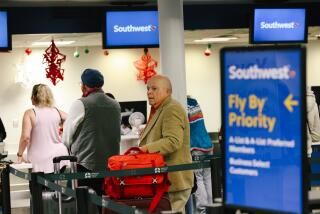PSA All Smiles as Its Employee Program Sells
Upset by the rock music generated by a younger passenger’s radio, the irate man flagged down a Pacific Southwest Airlines flight attendant last week and demanded that she “tell that bimbo to cool it with the ghetto blaster.”
With a bright smile--and pointedly addressing the teen-ager as “sir”--the flight attendant politely asked the teen-ager if he had a set of ear plugs for his radio.
After the cabin grew quiet, the man settled back with his Fortune magazine, the flight attendant busied herself with the refreshment cart, and the teen-ager watched the San Francisco Bay area disappear as the plane winged its way to San Diego.
“In the pressure-filled world in which we live, both as employees and customers, the release of anger is getting more and more commonplace,” said Joan Miszak, staff vice president of human resource development at Pacific Southwest Airlines. “Customers generally are paying more for services and products so they have higher expectations.”
Unmet expectations cause people to get mad, said Miszak, who has designed programs which provide the skills and techniques needed to keep small problems from mushrooming.
“There’s (an) . . . increased need for these skills in everyone’s life,” Miszak said. “In small-town environments decades ago these things tended not to be so important.”
Companies can help their employees by teaching them to build pride in their work, said Miszak, who added that bottom lines can benefit when employees “take responsibility for their own fulfillment.”
Fulfillment has gained in importance at service companies with employees who are facing extremely repetitive or “mechanical” interactions with customers, Miszak said.
“We’re teaching them how to raise the level of service to a different level,” Miszak said. “We don’t expect (customers) to walk away saying ‘Wow, what an interaction,’ but both the employee and the customer (can) find the (transaction) more memorable.”
Miszak has reminded PSA’s employees that, for a harried passenger, even a relatively simple flight from Los Angeles to San Francisco can be turned into an obstacle course.
“Just getting on the freeway in the morning can be rough, assuming that your alarm went off in the first place,” Miszak said. “Then . . . you’ve got to find a parking spot, wait in line to purchase a ticket, wait for the security check, and then wait in line to check in at the gate.
“And you haven’t even gotten to the place where you’re going, to see if your rental car is there so you can go get lost somewhere on the streets of San Francisco.”
With that preflight potential for things to go awry, Miszak said, PSA employees must be trained to fulfill the airline’s “Catch Our Smile” motto.
Consequently, Miszak’s four-person staff has created four courses which hone employees’ service, sales and marketing techniques. A fifth course that is now in the “embryonic stage” will explore issues which arise as new technology pushes into the nation’s industrial and service sectors.
PSA’s so-called “People Difference” programs began nearly four years ago as an internal program. However, the airline subsequently took its training show on the road to a diverse group of customers that includes San Diego Gas & Electric, the California Department of Motor Vehicles, the Los Angeles Department of Water and Power and a growing number of health care companies.
The “People Difference” programs have been offered at more than 150 companies across the country, said Miszak, who added that about half of those companies regularly turn to PSA for additional training programs.
However, Miszak acknowledged that the “People Difference” program has not necessarily been a moneymaker for PSA. “There’s a residual value from what we do outside of the company that is of more interest than the fees we charge,” Miszak said. “We do provide a service that’s extremely competitive . . . and we’ve spoken eye-to-eye with hundreds of people in PSA territory.” Although the programs are designed to benefit “everybody from the executive level to the janitorial level,” Miszak said, the response is heaviest from industries faced with changing competitive environments.
” . . . Change causes ambiguity,” Miszak said. “We’re trying to teach people that just because they’re in a state of change doesn’t mean their jobs can’t be self-fulfilling.”
More to Read
Inside the business of entertainment
The Wide Shot brings you news, analysis and insights on everything from streaming wars to production — and what it all means for the future.
You may occasionally receive promotional content from the Los Angeles Times.










